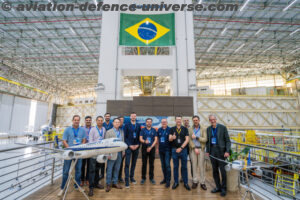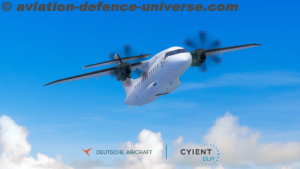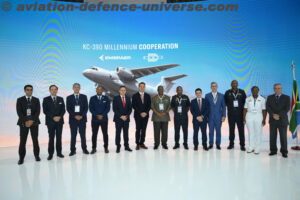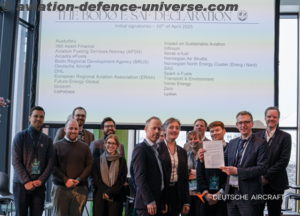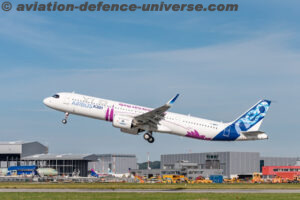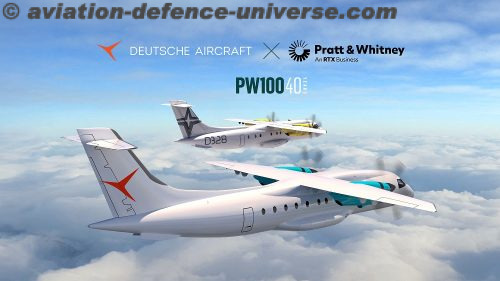 VANCOUVER, Canada, (Nov. 4, 2024) — Deutsche Aircraft, and Pratt & Whitney Canada, announce the conclusion of a series of five emission and contrail measurement flights on a D328® UpLift research aircraft using a fully synthetic Fischer-Tropsch fuel, preparing for the use of future sustainable aviation fuels (SAF) produced using Power-to-Liquid (PtL) technology. This significant achievement marks a new milestone in the 40 years of collaboration between the two companies and helps pave the way to ensuring that Deutsche Aircraft’s next generation 40-seater D328eco™ powered by Pratt & Whitney Canada PW127XT-S engines will be ready to operate with future specifications for 100% SAF from the aircraft’s Entry into Service (EIS) in 2027. Pratt & Whitney is an RTX business (NYSE: RTX).
VANCOUVER, Canada, (Nov. 4, 2024) — Deutsche Aircraft, and Pratt & Whitney Canada, announce the conclusion of a series of five emission and contrail measurement flights on a D328® UpLift research aircraft using a fully synthetic Fischer-Tropsch fuel, preparing for the use of future sustainable aviation fuels (SAF) produced using Power-to-Liquid (PtL) technology. This significant achievement marks a new milestone in the 40 years of collaboration between the two companies and helps pave the way to ensuring that Deutsche Aircraft’s next generation 40-seater D328eco™ powered by Pratt & Whitney Canada PW127XT-S engines will be ready to operate with future specifications for 100% SAF from the aircraft’s Entry into Service (EIS) in 2027. Pratt & Whitney is an RTX business (NYSE: RTX).
The test flight on this synthetic fuel was conducted during the UpLift-CLIM0ART project in collaboration with the German Aerospace Center (DLR), and demonstrates the ability of the D328® UpLift, powered by Pratt & Whitney Canada’s PW119B engines, to deliver the same performance and efficiency as when utilizing conventional kerosene fuel. Due to having the exact same chemical and technical properties, Fischer-Tropsch synthetic paraffinic kerosene (FT-SPK) served as a proxy for future PtL SAF, which will be produced using water, CO2, and renewable energy in the future. PtL is expected to be a key production pathway to meet future demand for SAF and help meet ICAO’s Long Term Ambitious Goal of net-zero CO2 emission by 2050, as well as reduce non-CO2 emissions due to enabling low to zero aromatic and sulfur content.
“This test flight is a testament to our shared commitment to enabling more sustainable aviation through the development of more efficient aircraft and enabling alternative fuels,” said Dave Jackson, CEO of Deutsche Aircraft. “To achieve our industry goals, we must enhance collaboration in research and technology while securing strong support from government and energy providers to scale up Sustainable Aviation Fuel (SAF) and Power-to-Liquid (PtL) production.
“The successful test flight of the D328® UpLift is a major achievement towards our goal of ensuring that the D328eco is ready to operate with future 100% SAF specifications from the EIS stage,” said Nico Neumann, COO of Deutsche Aircraft. “This new capability, along with the overall performance and efficiency of the D328eco and its PW127XT-S engines, will establish new benchmarks in regional aviation. Additionally, the insights gained from D328® UpLift’s test flights using synthetic fuel without aromatics will support the overall effort to reduce the environmental footprint of the aviation industry.”
“The development of the PW127XT-S for the next generation Deutsche Aircraft D328eco reflects our shared goal of changing the standards of efficiency and sustainability in the aviation industry, and continues our 40-year-long collaborative relationship,” said Maria Della Posta, president of Pratt & Whitney Canada. “Our PW127XT engine series delivers unrivalled performance in terms of fuel burn, emissions, and operating economics, and will further drive sustainability by operating with more sustainable aviation fuels, including future specifications for 100% SAF.”
The PW127XT is the most advanced member of Pratt & Whitney Canada’s PW100 engine series, which has powered regional turboprop aircraft for forty years and accumulated more than 220 million flight hours. Launched in 2021, PW127XT engines offers over 3% better fuel efficiency, 40% improved time on and wing, and 20% reduced maintenance costs. All Pratt & Whitney Canada engines are certified to operate with SAF blended up to 50% with conventional Jet A/A1 kerosene fuel and the company is actively supporting industry efforts to develop future specifications for 100% SAF.






































